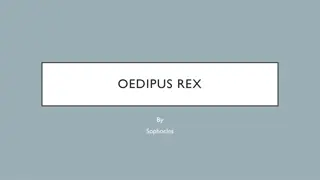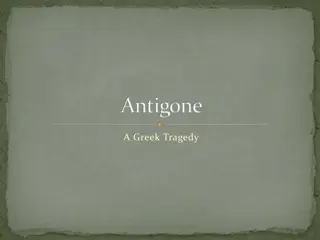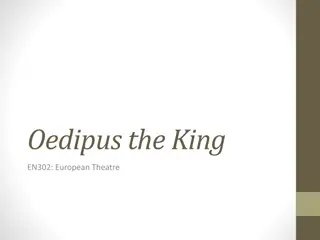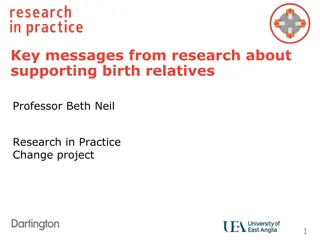Nietzsche on Oedipus: Insights from The Birth of Tragedy
Nietzsche delves into the tragic story of Oedipus, highlighting his doomed fate, nobility intertwined with error and misery, and the profound influence of his boundless grief. Through Oedipus, Nietzsche reflects on the themes of wisdom, natural order, and the consequences of challenging nature's laws.
Download Presentation

Please find below an Image/Link to download the presentation.
The content on the website is provided AS IS for your information and personal use only. It may not be sold, licensed, or shared on other websites without obtaining consent from the author. Download presentation by click this link. If you encounter any issues during the download, it is possible that the publisher has removed the file from their server.
E N D
Presentation Transcript
Nietzsche on Oedipus From The Birth of Tragedy: Sophocles conceived doomed Oedipus the greatest sufferer of the Greek stage, as a pattern of nobility, destined to error and misery despite his wisdom, yet exercising a beneficent influence upon his environment in virtue of his boundless grief.
Nietzsche: The Birth of Tragedy "An old legend has it that King Midas hunted a long time in the woods for the wise Silenus, companion of Dionysos, without being able to catch him. When he finally had caught him the king asked him what he considered man's greatest good. The daemon remained sullen and uncommunicative until finally, forced by the king, he broke into a shrill laugh and spoke:
Nietzsche: The Birth of Tragedy 'Ephemeral wretch, begotten by accident and toil, why do you force me to tell you what it would be your greatest boon not to hear? What would be best for you is quite beyond your reach: not to have been born, not to be, to be nothing. But the second best is to die soon.
Nietzsche on Oedipus Oedipus, his father's murderer, his mother's lover, solver of the Sphinx's riddle! What is the meaning of this triple fate?
Nietzsche on Oedipus This is the recognition I find expressed in the terrible triad of Oedipean fates: the same man who solved the riddle of nature (the ambiguous Sphinx) must also, as murderer of his father and husband of his mother, break the consecrated tables of the natural order.
Nietzsche on Oedipus It is as though the myth whispered to us that wisdom, and especially Dionysian wisdom, is an unnatural crime, and that whoever, in pride of knowledge, hurls nature into the abyss of destruction, must himself experience nature's disintegration.
Nietzsche on Oedipus The edge of wisdom is turned against the wise man; wisdom is a crime committed on nature : such are the terrible words addressed to us by myth.



























